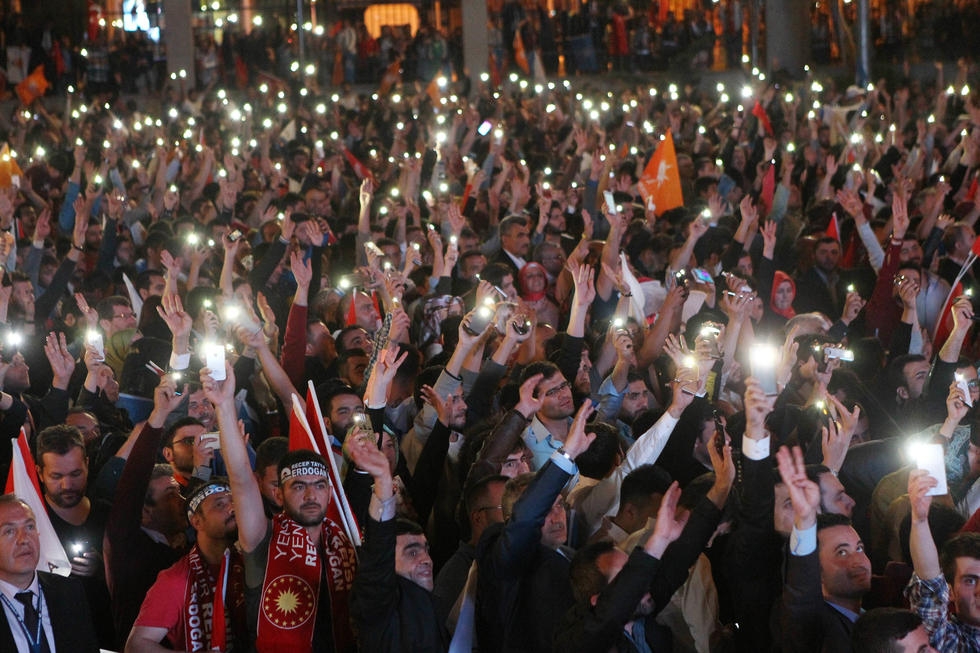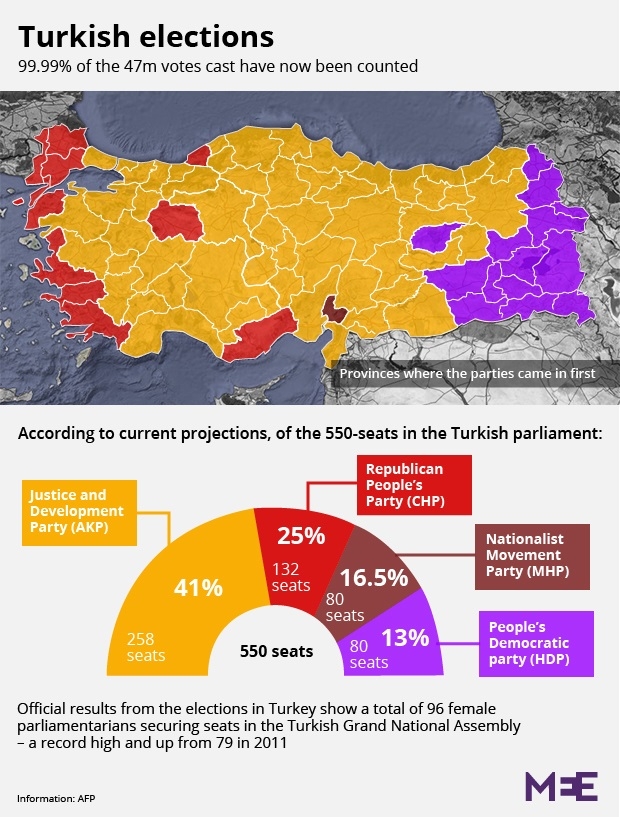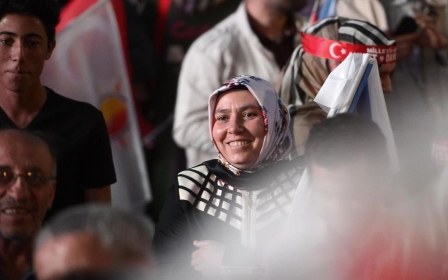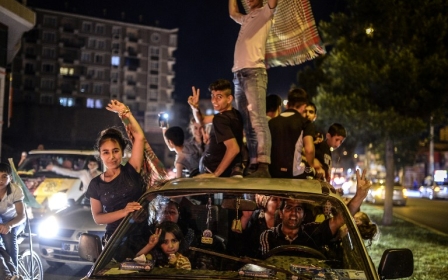Turkish crossroads: Coalition government or a repeat vote?

The loss of Turkey's ruling Justice and Development Party (AKP) of its parliamentary majority in Sunday's legislative elections has opened the door for the formation of a coalition government or the prospect of a new election in 45 days.
This is the first time that the AKP has not secured a majority in parliament since 2002, with the party winning 41 percent of the vote, which translates to 258 seats in the 550-seat parliament.
The Republican People's Party (CHP) won 25 percent of the vote and 132 seats, the Nationalist Movement Party (MHP) secured 16.5 percent and 80 seats with the pro-Kurdish Peoples' Democratic Party HDP boasting a surprise 13 percent and securing 80 seats. The AKP needed to secure 276 seats in order for it to govern alone, meaning that it fell short by 22 seats and would need to find a coalition partner if it wants to govern.
If a coalition government – with AKP or without - is not formed within 45 days then President Recep Tayyip Erdogan may be forced to call for new elections.
AKP deputy and head of the parliamentary constitution commission Burhan Kuzu has now said that snap elections were "inevitable". "No government will emerge from this scenario. Not even a coalition ... early elections look inevitable," he told BBC Turkey.
Turkish deputy premier Numan Kurtulmus, however, said that the AKP will first attempt to form a coalition government.
Meanwhile, another deputy prime minister, Bulent Arinc, invited the CHP, MHP and the HDP to form a governing coalition "if they can."
The official results were based on 99.9 percent of with a turnout of 86 percent, down 1 percent from the 2011 vote. The AKP had reportedly secured 47 percent of the overseas vote.
The problem, however, is that thus far none of the AKP's rivals in parliament appear to be willing to enter into a coalition with the former government.Devlet Bahceli, the leader of MHP, has ruled out entering a coalition with the AKP. "MHP is ready to be a main opposition party in a possible AKP-CHP-HDP coalition," he told reporters on Sunday.
HDP leader Selahattin Demirtas also told supporters in Istanbul that his party would be a "strong and honest opposition" to the AKP, ruling out being in a government coalition. "We will not form any coalition [government], whether inside or outside, with the AK party," he said.
The CHP, which came second, has likewise been the main opposition to the AKP's 13 year rule, and are seen as the least likely coalition partners for the AKP.
An AKP-free coalition also seems unlikely given the animosity between the pro-Kurdish HDP and the nationalists MHP.
There is the possibility of a short-lived AKP minority government, which would be forced to call for another election sooner or later due to the level of hostility seen during the election campaign.
Some voters said they had resorted to tactical voting, instead of voting for the parties they traditionally support, in order to deny giving AKP the majority it needed to form a government.
"I voted for HDP because it’s the only party that can break up Erdogan’s bid for absolute power," Selen Olcay, 47, a fitness instructor who voted in Istanbul’s Sariyer District told the New York Times.
"In this election a lot of Turks abandoned their ideological preferences and voted strategically to derail Erdogan’s one-man rule."
The HDP had passed the 10 percent threshold to enter parliament as a party. In the previous parliament, HDP members were present as independents.
Some Turkey-based Western observers expected the results to be even less favourable for the AKP.
"It still remains a real puzzle that the AKP performed so strongly despite the lack of visible support for it among the man in the street," David Barchard, a Turkish affairs analyst and MEE contributor, said.
"But for the next few months it will be fighting to survive and recover its ascendancy and the agenda will be rather different from what was envisaged at the start of the campaign," he added.
Business as usual?
The Turkish stock market and lira currency tumbled on Monday, in an apparent reaction to uncertainty with regards to the shape of the next government.
Prior to the elections, investors told the Wall Street Journal that uncertainty may unsettle foreign investment.
The Turkish Industrialists' and Businessmen's Association (TUSIAD), the country's major business association, called on all political parties to work together.
"We wish our political parties to act according to the consensus culture of democracy and to rally around the interests of the country," TUSIAD said in a statement, noting that
The election results were welcomed by the European Union as a "clear sign of strength of the Turkish democracy."
"The coming period offers opportunities for further strengthening the EU-Turkey relationship and to advance in broadening EU-Turkey cooperation in all fields," said EU foreign policy chief Federica Mogherini and Johannes Hahn, Commissioner for European Neighbourhood Policy and Enlargement Negotiations, in a joint statement on Monday.
Meanwhile, Erdogan praised the conduct of the elections, noting that "with the highest of turnouts, the polls reflect the will of our dear nation and its commitment to democracy."
However, he also acknowledged that "according to the available results, no party will be able to govern alone."
"In this new process, it is of great importance that all the political forces show responsible behaviour and the necessary sensitivity to preserve the atmosphere of stability and confidence in our country and our democratic achievements," Erdogan said in a statement.
New MEE newsletter: Jerusalem Dispatch
Sign up to get the latest insights and analysis on Israel-Palestine, alongside Turkey Unpacked and other MEE newsletters
Middle East Eye delivers independent and unrivalled coverage and analysis of the Middle East, North Africa and beyond. To learn more about republishing this content and the associated fees, please fill out this form. More about MEE can be found here.





